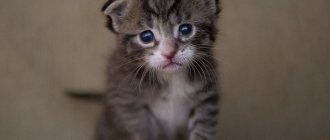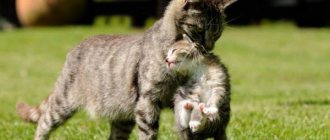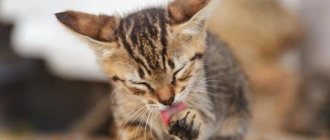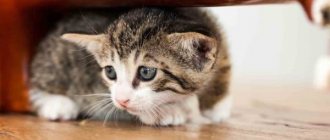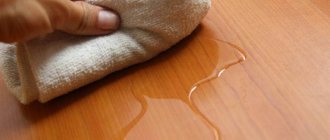How to reduce the risk of abandonment of offspring
Try to follow the basic rules:
- the cat should have a warm and quiet place for giving birth and subsequent feeding of kittens;
- the cat should eat food high in nutrients;
- there is no need to touch kittens in the first two weeks of their life unless necessary;
- other pets should not have access to the cat with kittens, including the cat.
If the cat does abandon the little kittens, there are other possible reasons:
- the cat is too young and this is her first birth;
- too many kittens;
- after giving birth, the cat developed complications, for example, mastitis;
- the cat has no milk;
Contact your veterinarian for advice. Try to feed the cat food with a high content of nutrients, move her house to a quiet and peaceful place - perhaps after a short time the maternal instinct will kick in and she will return to her cubs.
A cat abandons kittens: a mistake of youth
But too young an age may well be the reason why a cat abandons her kittens and leaves. There is a time for everything - this phrase is most suitable for young, in the literal sense of the word, mothers.
Alas, in mammals the maternal instinct sometimes manifests itself later than the sexual instinct. Owners of unsterilized young cats should keep this issue under control if they do not want to be left alone with blind, helpless squeaking lumps. True, it happens that motherhood still returns the cat to her babies on the second or third day after birth.
How to feed a kitten
Unfortunately, such measures do not always lead to the return of the mother to her offspring. You will have to take on the responsibilities of being a mother. The best option would be to give the kittens to be raised by another cat that has just given birth. If you cannot find a nursing cat, you will have to try to feed the kittens at home.
- How to properly feed a kitten without a mother? First of all, you need to purchase a special mixture for newborn kittens at a pet store. The composition of such mixtures is very similar to mother's cat milk. Under no circumstances should you feed your kitten natural cow's milk: it is very different in composition from cat's milk and can lead to intestinal problems.
- Before feeding the kitten, you need to stimulate it: stroke its head, back, and tummy, imitating maternal licking.
- The temperature of the feeding mixture should be 36–38°C. Before feeding your kitten, place a drop of the mixture on your wrist to check the temperature. It is best to feed your kitten using a disposable syringe without a needle - this way you can control the portion size.
- In the first week of life, kittens need to be fed every 2 hours. In the second week, the frequency of feedings is reduced to 8 times a day. From the third week, kittens need to be fed only during the day, but at least 6 times a day.
- How much should a kitten eat? Pay attention to his behavior. A full-fed kitten falls asleep almost immediately. If there is not enough food, the kitten will continue to squeak and poke at your hands in search of a pacifier.
- After each feeding, the cat licks her litter to stimulate digestion and help the kittens go to the toilet. After each feeding, you will have to wipe the kitten's belly and butt with a soft cloth soaked in warm water.
How to feed a newborn kitten without a cat?
Kittens cannot lap on their own; they must be fed with a syringe or pipette. A mandatory condition is a tummy massage. It is carried out immediately after feeding the crumbs. It is necessary to make longitudinal movements in the direction from the head to the tummy, lightly massaging.
How to feed a newborn kitten without a cat:
- There is no need to give kittens water. Everything you need is contained in the mixture. Under no circumstances should babies be fed pure cow's milk.
- It can negatively affect the digestive system of animals. Kittens that are fed milk often experience diarrhea, indigestion, constipation, or even diarrhea. It is necessary to prepare a special mixture.
- Starting from two weeks of age, it is necessary to purchase soft, wet food for kittens. It is added to the milk mixture in an amount of approximately 1/3. Gradually the amount of wet food in the mixture increases. Already at the age of 3 weeks, the kitten can be fed wet food.
Cat feeding puppies
Self-feeding kitten
At the age of three weeks, you can begin to introduce complementary foods into the kittens' diet. To avoid causing digestive disorders, portions should be very small, about the size of a pea.
What can and cannot be fed to kittens?
Can:
- food of soft and delicate consistency for kittens, preferably in the form of mousse.
It is forbidden:
- raw meat and fish;
- fatty, salty and fried foods;
- chocolate and sweets;
- food from your table.
How often should you give your kitten food? After introducing complementary foods, the frequency of feedings can be gradually reduced. In any case, consult your veterinarian regarding nutrition and introduction of complementary foods.
Is it possible to make a cat start feeding its offspring?
It is important to understand as soon as possible why a female cat refuses to feed her kittens.
What to do right away - contact the veterinarian with a house call. A veterinarian can make a diagnosis and prescribe treatment, including hormonal medications, if this is the problem. The animal should stop experiencing discomfort and pain, and normal lactation should begin.
If you are confident that labor will proceed normally, but the cat still refuses to feed the kittens, this is what you need to do.
If she does not show aggression towards the kittens, but simply does not pay attention to them, then you should sit (lay) her next to them and calmly stroke her, say something to your pet in a calm voice - and at the same time put one kitten under her side...
Newborns should not be handled with bare hands, so as not to be additionally “stained” with human odor - it is better to handle them with a hand wearing a medical glove.
We invite you to familiarize yourself with Devon Rex cat breed photo
In order for the cat to recognize the kittens as her offspring, they can be “marked” by smearing a little mother’s milk (if it appears on the cat’s nipples) or her urine on each fur. Sometimes there are also tips to drop a little of the cat’s favorite treat on the newborn “refuser” kitten - for example, sour cream, so that she starts licking the kitten, licking the sour cream.
Creating conditions for kittens
To raise a kitten without a cat, you will have to replace the mother not only in the feeding process. You need to provide the kittens with a place to sleep and play, learn how to wash the kitten, and give it a massage.
- A place to sleep. You can use a small box as a sleeping place. Place soft cloths, baby diapers or towels there. During the first weeks of life, the temperature of the kittens' bed should be similar to the mother cat's body temperature. The room temperature will need to be maintained at 29-32°C, then gradually reduced to 24°C. If kittens are cold, use a warm water bottle or a small heater as a heating pad. The sleeping area should be clean, so wash the bedding promptly, being careful not to use chemical cleaners.
- Washing and massage. It is best to wash the kitten with a cotton pad or soft cloth soaked in warm water. When washing, imitate the movements of a mother cat - move along the kitten’s fur in one direction, from top to bottom. Before and after each feeding, it is necessary to massage the kitten's tummy to stimulate digestion and bowel movements.
Possible problems for a cat after giving birth
- Hormonal imbalance leading to disruption of lactation. After childbirth, alarming symptoms often appear, consisting in the inability to process glucose. This leads to a state of shock. The condition improves after injection with insulin, but it is better to get tested and consult a veterinarian;
- Stressful state. It arises due to human intervention (intentional or accidental). For example, in the first hours after birth, kittens were picked up and moved or the nest was moved. A change of bedding or furnishings, or bright light could frighten the young mother. The cat may eventually take back her offspring. In this case, the owner should try to provide comfort and, as soon as the young mother calms down and finds a closed place, she needs to put a nest with kittens there.
- Birth of non-viable kittens. It also happens that the offspring are too numerous, and the mother cat, feeling a lack of milk, does not feed the weak (but potentially having a chance to survive) babies. In this case, the owner has to provide assistance in caring for the offspring;
- Complicated childbirth and its consequences - endometritis, mastitis, etc. A cat does not think about its offspring if it feels pain, it only cares about its own condition. Some animals in a state of “postpartum insanity” may crush, tear to pieces or eat their babies.
- Too early (by cat standards) birth and pregnancy. The animal does not reach puberty and becomes pregnant. But it does not want to raise its offspring further.
- Lack of calcium or eclampsia is a dangerous condition for a young mother, requiring injections with the appropriate microelement and observation of the animal.
It may turn out that the reason for the reluctance to feed is a weak condition. If the cat rests, it will gain strength and begin to fulfill its duties towards the offspring.
There is no need to panic; it is better to provide the nurse with a large volume of liquid - milk, broth and water. Kittens need warmth while their mother is away. You will need a heating pad in soft fabric, which is placed in the nest. The cat needs to be calmed down, caressed, and treated to something tasty by all means.
Visits to a veterinarian
If you have any questions about caring for kittens, please contact your veterinarian. He will tell you all the nuances, talk about vaccinations and check the pet’s health. Be sure to visit the clinic if something in the kitten’s behavior or appearance confuses you. Reasons for visiting a veterinarian may include discharge from the kitten's eyes or nose, unusual lethargy, lack of appetite, unusual stool, and injuries.
Caring for newborn kittens is a difficult and responsible task, but with proper attention and patience, you will be able to feed and raise them.
Cat leaves kittens due to stress
Stress may well cause a cat to abandon its own children. For example, excessive attention to a cat during childbirth or constant visits from strangers to the nest where a mother and newborn kittens are located cause excessive anxiety in the animal and can provoke atypical behavior.
The cause of psychological trauma can also be an unsafe nest location from the cat’s point of view (that is, a box or basket that serves as a postpartum chamber) or the appearance of other pets in the house.
Sick or stranger
Everyone knows that under no circumstances should you handle baby wild animals: because of the foreign smell, the mother will abandon such a baby. But for some reason, few people think that this may be the reason why the cat leaves - kittens, even newborns, are often picked up and squeezed in the most unceremonious way. If babies lose their mother's scent, there is a very high probability that the mother will abandon them.
What to do if a cat abandoned her kittens and left
In most cases, there is nothing you can do. If a cat for some reason (young age, poorly developed maternal instinct, non-viable offspring) abandoned her kittens, you need to come to terms with this. It’s another matter when the cause is one of the physiological disorders. Mastitis, eclampsia, lack of lactation, even a stressful condition - these disorders can be cured, the main thing is to detect the disease in time, make a correct diagnosis and start treatment in a timely manner.
Tips for caring for cats, useful information on raising your pet, as well as other articles about cats.
Source
Instinct with damage
There are cats whose hunting instinct is poorly developed and they do not catch mice. And there are those whose maternal instinct is poorly developed. Of course, there are few of these, because this is, in fact, a mistake of nature, but such cats still exist.
Whatever the reason why the cat abandons the kittens and leaves, you should not scold or hit her, this will only make the situation worse. A sick animal must be treated. In other cases, you can try to “reconcile” the mother and cubs by calming the cat down, talking kindly to her and expressing your approval in every possible way.
If this does not help, there is only one thing left to do - find a nurse for the “orphans” or take on maternal responsibilities. But this is a topic for another discussion.
Source
Why is this happening?
Atypical behavior of a mother cat appears for various reasons: - illness;
- lack of milk; - stress; - young age; — foreign smell; - non-viability of babies; - spoiled; - estrus after childbirth; - hormonal disbalance. The most common cause is illness. Pregnancy and childbirth are a big burden on the body, which often has disastrous consequences. A young mother most often develops: - mastitis - inflammation of the mammary glands; - eclampsia - lack of calcium (accompanied by convulsions); - endometritis - inflammation of the uterus.
After a difficult birth, it is difficult for a cat to return to its previous state. Weakness and pain make you run away and hide. Treatment of a cat should be entrusted to a veterinarian.
Childbirth is also a lot of stress. The cat needs to be reassured, be close and create a feeling of security. Fussiness around, an uncomfortable or cold place to hide also worsens the animal’s condition.
Most mammals develop sexual instinct first, and then maternal instinct. A young cat is hormonally ready to mate, but is not ready to care for offspring. Therefore, do not rush to breed a young cat.
Spoiled individuals do not bother themselves with caring for their offspring. They have an all-powerful person who can handle this task. Excessive care “turns off” the maternal instinct in a cat.
Behavior may change due to hormonal imbalance. For example, the onset of estrus signals readiness for a new mating, which does not correspond to maternal instinct. This can even happen to cats who are not mothers for the first time. Due to illness or hormonal imbalance, milk often disappears.
Silence and peace for kittens
If there are small children in the house, explain to them that you can only pick up the kitten for care and feeding; the kids are not yet strong enough for play. There is also no need to carry around a nest box with kittens. Kittens' sleep is superficial, restless, with dreams, apparently. They are already twitching their paws, waking themselves up, looking for their mother, looking for something to cling to, so there is no point in bothering them or waking them up on purpose.
In the first days, the outer ear in kittens is not developed, the auditory opening does not differ, hearing will be achieved by 9-11 days. But you still need to maintain relative silence, do not jump or stomp near the kittens, do not pull the box - the kittens feel the vibration. The box needs to be covered with something on top, even a dark rag, so that the bright light does not damage the eyes.
Caring for orphan kittens
When raising orphans, it is important to monitor the sanitary condition of the nest. To arrange it, it is better to use disposable baby diapers. Cleanliness for newborn babies is the key to health and prevention of viral infections.
Orphan kittens, especially at newborn age, have no chance of survival without human help. Only competent actions of the owner, application of knowledge about the physiology of newborn animals, patience, love and care for helpless furry creatures will help preserve the life and health of the cubs left without maternal care.
Feeding babies without a mother is not as easy as it might seem. It’s especially difficult to get through the first week together. However, the experience of many breeders proves that even if a cat refuses her babies, it is quite possible to get them out on their own. The main thing is to have enough strength, patience and, of course, knowledge of the basic rules.
Instructions for the care and feeding of newborn kittens. Animals are more likely than people to abandon their offspring; there are many reasons for this. In this article we will tell you why the cat abandoned her kittens and how to feed them.
[custom_ads_shortcode2]
What to do
- If the cat abandoned the kittens immediately after birth, then you need to give them colostrum - the first milk that the cat produced after giving birth.
- Keep kittens warm.
- Prepare them a special milk formula (not cow's milk) and feed them on a very busy schedule.
- Make sure they gain weight.
- Wash them with a sponge soaked in warm water and massage their tummy.
In any case, you need to try to solve the problem with the cat and take it to the veterinarian. Maybe the problem lies in her health, and something can be done about it. You can also try to find a surrogate mother for the kittens - a cat who has recently given birth and is ready to shelter other people's kittens.
You may also be interested in the following articles:
- Why are cats afraid of cucumbers?
- Why do cats curl up in a ball when they sleep?
